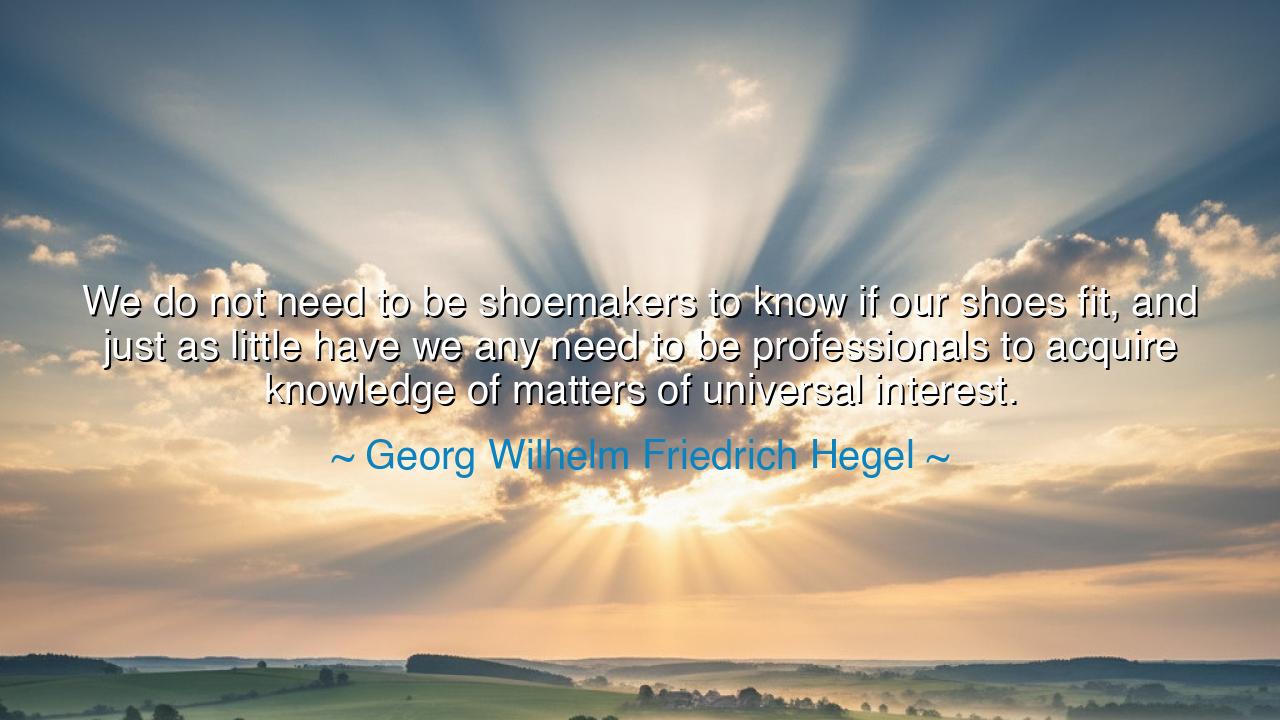
We do not need to be shoemakers to know if our shoes fit, and
We do not need to be shoemakers to know if our shoes fit, and just as little have we any need to be professionals to acquire knowledge of matters of universal interest.






“We do not need to be shoemakers to know if our shoes fit, and just as little have we any need to be professionals to acquire knowledge of matters of universal interest.” Thus spoke Georg Wilhelm Friedrich Hegel, the philosopher who sought to understand the movement of spirit and reason through all of history. His words, though simple, cut deeply into the pride of specialists and the fear of the common soul. He reminds us that truth is not the property of the learned alone, and that wisdom can dwell in any heart that dares to seek it. For just as a man feels when his shoes pinch or fit, so too does the soul feel the weight of ideas that either bind it or set it free.
Hegel’s saying rises as a defense of the human intellect itself — the birthright of all. Too often, men bow before the idols of expertise, believing that only the scholar, the scientist, or the philosopher has the right to speak of truth. But Hegel, who wandered through the labyrinths of thought, knew that reason breathes in all humanity, not only in the cloisters of the academy. He spoke for the farmer who senses justice without reading law, for the mother who knows love’s wisdom without studying ethics, for the craftsman who understands beauty without having studied art. The mind that seeks understanding of matters of universal interest — of love, of freedom, of mortality, of meaning — need not wear the robes of a scholar. It need only be awake.
In the ancient world, this truth was honored. Socrates, the barefoot sage of Athens, walked among the common folk, questioning them not to mock, but to awaken. He spoke with blacksmiths, sailors, and slaves, showing that within each lived the spark of reason — the power to question, to know, to grow. When he said that wisdom begins in knowing that one knows nothing, he was not exalting ignorance, but reminding humanity that the door to understanding opens from within. The cobbler may not speak in polished words, but he knows whether his craft brings comfort or pain; likewise, each person knows when an idea rings false in the heart. Truth is not hidden from the simple — it is hidden from the arrogant.
Consider, then, the tale of Galileo Galilei, who gazed through his telescope and saw moons circling Jupiter. The learned men of his day — priests, philosophers, professors — dismissed him, saying that he was no theologian fit to interpret the heavens. Yet it was not training but courage that allowed Galileo to see what was before him. He trusted the evidence of his eyes and the reasoning of his mind. In this way, he proved that truth belongs not to those who claim authority, but to those who seek it earnestly and test it honestly. His life became the echo of Hegel’s words — that the soul need not hold a title to perceive what is real.
There is in this teaching both humility and empowerment. Hegel does not scorn learning — indeed, he was a titan of it — but he warns that learning without openness becomes pride, and pride blinds the mind. The scholar must remember that knowledge is a river flowing through all hearts, not a well guarded by a few. The peasant who looks at the stars and wonders, the child who asks “why,” the citizen who questions the justness of power — all are participants in the divine dance of understanding. The universal interest belongs to the universal spirit of mankind.
Let us then learn from Hegel not to doubt our capacity for knowledge, nor to despise those who have learned deeply. Let the learned guide with humility, and let the unlearned listen with courage. Every man and woman, regardless of station, has the right — indeed, the duty — to engage in the pursuit of truth, beauty, and justice. For civilization does not advance when experts speak alone, but when the multitude learns to think for itself. The wisdom of one sage is but a candle; the wisdom of all awakened minds is the sunrise of a new world.
So, my child, do not silence yourself in the presence of greatness, nor dismiss your heart’s insight as foolishness. When you ponder the world, when you speak of right and wrong, when you seek understanding of life’s great mysteries — trust that your mind, too, was fashioned for such things. Feel your ideas as you would your shoes — if they fit, if they comfort, if they help you walk more freely through life, they are yours to keep. But if they pinch, if they burden, cast them aside and find better ones. For the measure of truth is not given by rank or degree, but by the harmony between the soul and the real. And in this, every human being is both student and philosopher, both wanderer and discoverer upon the eternal road of wisdom.






AAdministratorAdministrator
Welcome, honored guests. Please leave a comment, we will respond soon